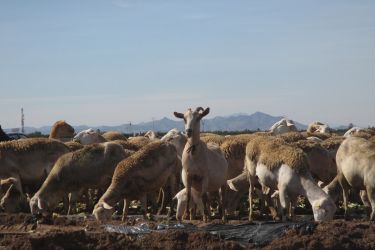A team from the Diverfarming project has found microplastics in 92% of the faeces of sheep fed in intensive agricultural zones of Murcia that they analysed
In recent times, the increase in plastic residues has been reasserted as being a major environmental problem. This material, which is present in packaging and day-to-day objects, plays a decisive role in intensive agriculture zones.
In the Region of Murcia, known as “Europe’s market garden”, mulch film (plastic covering over the crop lines) increases production in vegetable fields, but involves using large amounts of plastic. This low-density plastic is difficult to completely remove from the fields and, with time, decomposes into smaller particles which are absorbed by the soil, transported by water or wind, and are also ingested by other animals.

They found that 100% of the soil samples analysed contained microplastics, as did 92% of the samples of sheep faeces studied. This, in turn, translates into concentrations of 2,000 particles of microplastics per kilogram of soil, and 1,000 particles per kilogram of dry faeces.
This analysis reveals a relevant concentration of plastics and warns about the ingestion of this material by sheep; future studies should analyse how ingesting the plastic affects the organism of these animals.
Despite the negative effects of the plastic and its accumulation in intensive agriculture zones, it is very difficult to do away with that material since techniques such as the use of mulch film enable savings in water and pesticides; these prove to be determining factors in semi-arid zones with scant rainfall, as is the case of the Murcia zone.
Reverting this trend will therefore require a change in paradigm in current agricultural production so as to relegate intensive cropping to a secondary role. The Diverfarming project, financed by the H2020 call of the European Commission seeks, in this sense, to bring about a change in European agriculture towards an agriculture that is more sustainable and respectful to the environment. By means of the combination of crop diversification and sustainable farming practices they seek to look after the planet whilst ensuring the farmers’ economic benefits.
Diverfarming is a project financed by the Horizon 2020 Programme of the European Commission, within the challenge of “Food Security, Sustainable Agriculture and Forestry, Marine, Maritime and Inland Water Research and the Bioeconomy”, under agreement 728003. It counts on the participation of the Universities of Cartagena and Córdoba (Spain), Tuscia (Italy), Exeter and Portsmouth (United Kingdom), Wageningen (Netherlands), Trier (Germany), Pecs (Hungary) and ETH Zurich (Switzerland), the research centres Consiglio per la ricerca in agricoltura e l'analisi dell'economia agraria (Italy), the Consejo Superior de Investigaciones Científicas (Spain) and the Natural Resources Institute LUKE (Finland), the agrarian organisation ASAJA, and the companies Casalasco and Barilla (Italy), Arento, LogísticaDFM and Industrias David (Spain), Nieuw Bromo Van Tilburg and Ekoboerdeij de Lingehof (Netherlands), Weingut Dr. Frey (Germany), Nedel-Market KFT and Gere (Hungary) and Paavolan Kotijuustola and Polven Juustola (Finland).
Beriot, N., Peek, J., Zornoza, R., Geissen, V. and Huerta Lwanga, E. (2020) Low density-microplastics detected in sheep faeces and soil: A case study from the intensive vegetable farming in Southeast Spain, Science of The Total Environment,142653, ISSN 0048-9697, https://doi.org/10.1016/j.scitotenv.2020.142653










